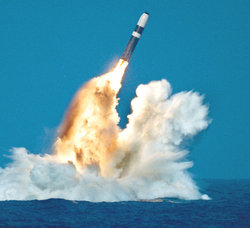Vladimir Putin On Hypersonic, Markovian Self-Adjusting Intercontinental Ballistic Missiles
"President Vladimir Putin boasted Tuesday that Russia has new missiles capable of penetrating any missile defense system and said he had briefed the French president on their capabilities.
"Russia has tested missile systems that no one in the world has," Putin said. "These missile systems don't represent a response to a missile defense system, but it doesn't matter to them whether that exists or not. They are hypersonic and capable of changing their flight path."
Putin said the new missiles were capable of carrying nuclear warheads. He wouldn't say whether the Russian military already had commissioned any such missiles....
Putin said the new missiles were capable of changing both altitude and direction, making it impossible for an enemy to intercept them since "a missile defense system is designed to counter missiles moving along a ballistic trajectory."
Putin and other Russian officials have boasted of the new missiles in similar comments in recent years, but they haven't identified them or given any further details other than about their ability to change their flight path on approach to a target.
Military analysts said Russian forces experimented with a maneuvering warhead during a missile launch several years ago, but voiced doubt about their ability to deploy such weapons anytime soon.
Analysts said the new warheads, designed to zigzag on their approach to targets, could be fitted to new land-based Topol-M missiles and the prospective Bulava missiles for the Russian navy, now under development.
Russia opposed Washington's withdrawal in 2002 from the 1972 Anti-Ballistic Missile Treaty in order to deploy a national missile defense shield, saying the 30-year-old U.S.-Soviet pact was a key element of international security. Putin called the decision a mistake that would hurt global security but not threaten Russia.
The ABM treaty banned missile defense systems on the assumption that the fear of retaliation would prevent each nation from launching a first strike - a strategy known as mutually assured destruction." ...
Vladmir Isachenkov "Putin Boasts of New Missile's Capability" WashingtonPost.com January 31, 2006.

Trident Intercontinental Ballistic Missle being launched from a U.S. Submarine.
Photo credit: Wikipedia www.answers.com/topic/ history-of-nuclear-weapons
"Russia has tested missile systems that no one in the world has," Putin said. "These missile systems don't represent a response to a missile defense system, but it doesn't matter to them whether that exists or not. They are hypersonic and capable of changing their flight path."
Putin said the new missiles were capable of carrying nuclear warheads. He wouldn't say whether the Russian military already had commissioned any such missiles....
Putin said the new missiles were capable of changing both altitude and direction, making it impossible for an enemy to intercept them since "a missile defense system is designed to counter missiles moving along a ballistic trajectory."
Putin and other Russian officials have boasted of the new missiles in similar comments in recent years, but they haven't identified them or given any further details other than about their ability to change their flight path on approach to a target.
Military analysts said Russian forces experimented with a maneuvering warhead during a missile launch several years ago, but voiced doubt about their ability to deploy such weapons anytime soon.
Analysts said the new warheads, designed to zigzag on their approach to targets, could be fitted to new land-based Topol-M missiles and the prospective Bulava missiles for the Russian navy, now under development.
Russia opposed Washington's withdrawal in 2002 from the 1972 Anti-Ballistic Missile Treaty in order to deploy a national missile defense shield, saying the 30-year-old U.S.-Soviet pact was a key element of international security. Putin called the decision a mistake that would hurt global security but not threaten Russia.
The ABM treaty banned missile defense systems on the assumption that the fear of retaliation would prevent each nation from launching a first strike - a strategy known as mutually assured destruction." ...
Vladmir Isachenkov "Putin Boasts of New Missile's Capability" WashingtonPost.com January 31, 2006.

Trident Intercontinental Ballistic Missle being launched from a U.S. Submarine.
Photo credit: Wikipedia www.answers.com/topic/ history-of-nuclear-weapons


0 Comments:
Post a Comment
<< Home